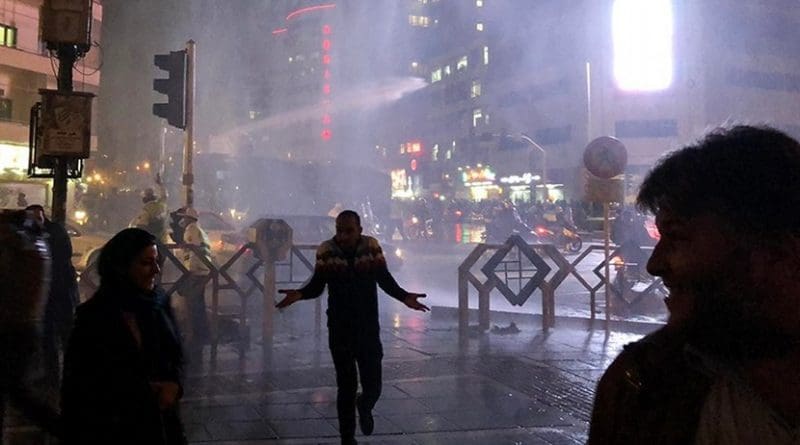Chasm Between Iran Regime And The People Grows – OpEd
By Arab News
By Dr Majid Rafizadeh*
Iran appears set to return to the negotiating table in Vienna this month, but the international community’s patience seems to be growing thin, as the Tehran regime’s nuclear defiance and regional terrorism intensify. At the same time, credible accusations that President Ebrahim Raisi was involved in the massacre of thousands of political prisoners in 1988 are making it harder for other countries to engage and negotiate with Iran.
The regime is dealing with a multitude of crises and challenges. The economy is in shambles, COVID-19 is wreaking havoc, the unemployment rate continues to set new records, and the official inflation rate is above 50 percent. State corruption is also at an all-time high and, to make matters worse, the regime is not easing its astronomical expenditure on its costly nuclear, ballistic missile and drone projects.
These are essential ingredients for massive social unrest — and the regime knows it. It is terrified of a repeat of the 2019 uprisings, which shook the entire country. The theocracy barely survived after conducting an unprecedented killing spree, gunning down at least 1,500 protesters on the streets in the space of a few days.
The recent presidential election farce displayed the growing chasm between the Iranian people and the regime. Supreme Leader Ali Khamenei installed Raisi as president and appointed an equally cruel judiciary chief in order to suppress all forms of dissent and opposition to his increasingly fragile rule.
For his part, Raisi has formed a Cabinet full of members of the security apparatus, the Quds Force and the Islamic Revolutionary Guard Corps, offering yet another indication that the regime is afraid of any further uprisings.
But the regime’s crises are so deep-rooted that the wisdom of such policies is highly questionable. The sheer force of the socioeconomic and political disasters created by the theocracy seem capable of inducing its downfall. Almost every sector of society is out in force with a growing list of demands and grievances, which the regime cannot address.
Moreover, there are rapidly mounting calls for Raisi’s international prosecution. It is believed that, in 1988, Raisi was one of the four members of the so-called “Death Commission” that ordered the execution of more than 30,000 political opponents, the majority of whom were members of the main oppositional group, the National Council of Resistance of Iran. The UN’s top official in charge of investigating human rights violations has, on several occasions, referred to the need for an international inquiry into Raisi’s role in the heinous massacre. The 1988 killings have been described as a crime against humanity and even genocide by respected human rights experts and lawyers.
As Tehran’s threats grow, the international community cannot sit silent. There are a number of immediate measures that can be adopted.
First of all, the EU and the US should focus the spotlight on the Iranian president’s human rights violations, particularly his role in the 1988 massacre and the suppression of protesters in November 2019.
Second, these international parties must practically pursue the prosecution of Raisi. The evidence is there, but the political will is missing.
This is becoming crystal clear to thousands of lawmakers and human rights activists on both sides of the Atlantic. A Free Iran summit was held in Washington last week to discuss Raisi’s involvement in the 1988 massacre and to call on governments to pursue his immediate prosecution. NCRI President-elect Maryam Rajavi joined a stellar roster of former senior government officials, including ex-Vice President Mike Pence, in addressing the summit.
“Regime change in Iran, by the Iranian people and their resistance, is inevitable and nothing can prevent it. It is time for the world to recognize this fact as well. The people of Iran expect governments, including the US and the European governments, to revise their policy on Iran and side with the Iranian people,” the dissident leader said.
The conference took place in the wake of the G20 summit and was attended by about 1,000 members of the Iranian American community. In his speech, Pence highlighted an important point, which can be the foundation for the third step that the international community can take. “One of the biggest lies the ruling regime has sold the world is that there is no alternative to the status quo. But there is an alternative; a well-organized, fully prepared, perfectly qualified and popularly supported alternative,” Pence said, referring to the NCRI.
This statement carries enormous political significance. It is not enough to pressure the ruling regime; one must also be clear-eyed about feasible alternatives. Opposition to the theocracy should not be ignored.
In conclusion, the Iranian people are rejecting the regime in their droves. The international community must align with this historically significant movement. As the regime’s political and strategic capital continues to deplete, the world must learn to stand with the Iranian people sooner rather than later.
- Dr. Majid Rafizadeh is a Harvard-educated Iranian-American political scientist. Twitter: @Dr_Rafizadeh

